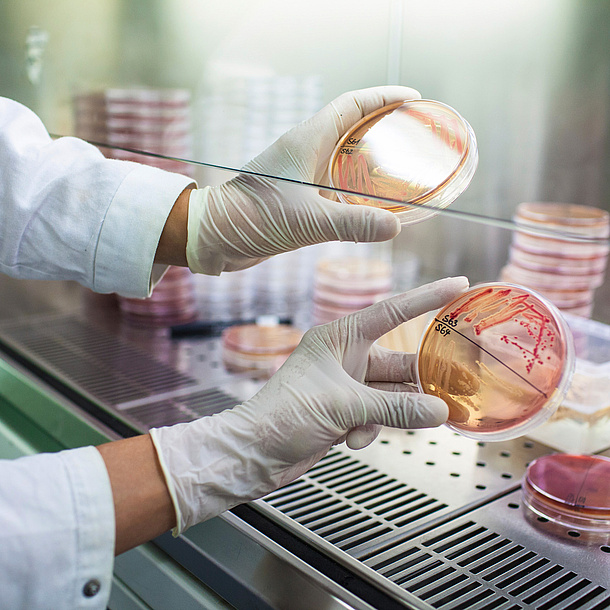Quick Facts
- Duration of study: 4 semesters
- ECTS credit points: 120
- Academic degree:
Diplom-Ingenieurin
orDiplom-Ingenieur
(Dipl.Ing. or DI), equivalent to the Master of Science (MSc) - Language of instruction: English
The Master's Programme
In the interdisciplinary NAWI Graz master’s degree programme Biotechnology, you will learn significantly more about the technological preparation of biosystems as well as the development and operation of biotechnological applications and processes.
You will learn working and analytical techniques in microbiology, molecular biology, biochemistry, genetic engineering, enzymology and fermentation technology. In addition to the focal point of gene expression, protein production and biocatalysis, you will also learn the basics in the area of environmental and food biotechnology.
In practical laboratory courses, for example, students learn how to use process control, adjust a pH and scale-up a fermentation process. You will be supported by an experienced team and will have access to optimal laboratory infrastructure with state-of-the-art fermentation plants of various sizes (pilot plants).
Focus Areas
You will acquire basic knowledge in the subject in the following compulsory modules:
- Molecular Biotechnology and Bioinformatics: You will learn working and analytical techniques of cell, protein and metabolic engineering and become familiar with the use of methods for the computer-aided analysis of DNA and protein sequences.
- Bioprocess Technology: You will acquire knowledge about the development and optimisation of modern bioprocesses.
- Environmental and Food Biotechnology: You will become familiar with biotechnological processes used for the production of food and animal feed, as well as microbial and enzymatic processes applied in these areas.
- Laboratory Project Biotechnology: You will carry out experimental laboratory work under the supervision of experienced scientists.
In addition, you can choose individual focal points in the following elective modules:
- Enzyme and Protein Technology
- Systems and Synthetic Biotechnology
- Bioprocess Engineering
- Environmental Biotechnology
- Food Biotechnology
Biotechnology is a key technology of the 21st century with a focus on applications in industry, agriculture, the environment and medicine. The interdisciplinary curriculum, positioned at the interface of basic and applied research, promotes problem solving capacities to educate and train bio-engineers prepared to tackle the challenges of the future.
Mario Klimacek, Dean of Studies
Collaborations and Networks
The close cooperation with acib (Austrian Research Centre of Industrial Biotechnology) enables students to establish firm contacts with potential employers and carry out master's thesis work with industrial partners. acib currently is constructing a network of about 300 partners in the field of industrial biotechnology.
In addition, firmly established networks with industrial partners in the pharmaceutical sector (e.g. Bayer Pharma AG, Sandoz GmbH, La Roche), as well as in the field of green chemistry (e.g. BASF SE) offers the students a good insight into practical applications.
Admission
The prerequisite for admission is a completed bachelor’s degree in a relevant subject (see curriculum).
Additionally, you need to provide evidence of competence in the English language.
1. Admission Procedure
Admission without admission procedure
Graduates of the bachelor’s degree programme Molecular Biology offered at TU Graz and University of Graz will be accepted without an admission procedure. Other previous degrees which may qualify for admission with or without special conditions, can be found in the curriculum.
Graduates of all other degree programmes offered at the TU Graz or, in the case of a NAWI Graz programme, the University of Graz can apply for admission at the Registrar's Office without an admission procedure.
Admission with admission procedure
Graduates of a previous study programme not mentioned above undergo an admission procedure.
Registration for the academic year 2026/27: 15 October to 15 December 2025
You can complete the admission procedure before the end of your bachelor’s studies.
Please do not send any documents by post!
2. Admission
- Admission and deadlines for international students
- Admission and deadlines for Austrian students who are registering to study at TU Graz for the first time
If you have already been admitted to a degree programme at TU Graz, or have studied at TU Graz before, please come to the Registrar's Office in person to complete your admission during the admission period.
Fragen zur Zulassung?
Contact study@tugraz.at
Double Degree Programme with KTH Stockholm
As part of the master's degree programme, you can complete a Double Degree Programme with KTH Stockholm (Sweden). You study both at TU Graz/Uni Graz and KTH Stockholm and receive a degree from both universities.
Study at two Universities
Students who have already been admitted to the master's programme Biotechnology at TU Graz/Uni Graz can apply for the double degree programme. Two students of TU Graz/Uni Graz are selected per academic year. Students must have acquired at least 45 ECTS at TU Graz/Uni Graz by the start of their stay at KTH Stockholm.
Further information can be found in the Curriculum §12 Double Degree Programme.
Students can find further information on the application process in the intranet TU4U.
![[Translate to Englisch:] KTH Stockholm Campus. Bildquelle: Jann Lipka [Translate to Englisch:] Campus der Universität KTH Stockholm von oben](https://www.tugraz.at/fileadmin/user_upload/tugrazInternal/Studium/Studienangebot/Masterstudien/Sujet/KTH-Stockholm-Campus-by-Jann_Lipka.jpg)
Consultation on the double degree programme
On courses and content
Mario KLIMACEK
Priv.-Doz. Dipl.-Ing. Dr.nat.techn.
Dean of Studies
mario.klimacek@tugraz.at
On the mobility scholarship
Manuel AUSSERLECHNER
MA
International Office
manuel.ausserlechner@tugraz.at
Career Prospects
Professional Fields
Biotechnologists work in both the private sector (biotech, chemical and pharmaceutical industries, consulting) and the public sector (research and test facilities, certification authorities, quality management, interest groups).
The employment opportunities are diverse. They range from careers in scientific research and development to the planning, control and monitoring of biotechnological processes and applications and on to the development of processes for the production of biological substances. Biotechnologists are active in the following areas:
- in industrial biotechnology
- in chemical production with biocatalytic processes
- in pharmaceutical research
- in food technology
- in environmental biotechnology
- in agricultural research
- in relevant university and non-university research institutions
- with authorities or institutions in the public sector
Graduates apply their knowledge practically, for example, as follows:
- in industry in the field of green chemistry, to make chemical processes more environmentally friendly.
- in the pharmaceutical industry in the area of biologicals development, i.e. to develop genetically engineered drugs that are used in cancer therapy, among other things.
Acquire AI skills: AIE Extension Programme
Increase your career prospects with the Artificial Intelligence Engineering (AIE) extension programme and learn essential skills in AI development and application during or after completing your Master's degree.




